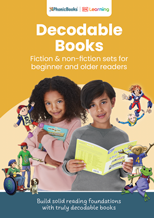Happy Spring!!
The weather is getting warmer, the flowers will be in bloom, and the Kindergarten Center teachers are wondering when it will be time to teach letter names! For those of you who did not read, “Lynbrook Takes the Lead on Long Island,” the Lynbrook School District is revamping its reading curriculum and is the first American school district to adopt the Sounds-Write program. Along with the growing pains of learning something new, the idea of teaching kids to identify letters by their sounds rather than by names is completely foreign here, and, quite frankly, stretching teachers to get out of their comfort zone. Traditionally, American kindergarten teachers have tried to ensure that their students know the letter names and the order of the alphabet by the end of the school year. Being encouraged to avoid letter names goes against everything they have come to believe about early childhood literacy.
Common errors for beginner and older struggling readers
Before the Kindergarten Center received their Sounds-Write training, I prepared them with the background knowledge for this paradigm shift. Having taught struggling readers for years, I have witnessed first-hand how many of them weave in letter names when attempting to sound out words. The letter Y does not represent the sound /w/, and the letter U does not represent the sound /y/, but those are common errors for beginning readers and older struggling readers. Often, kids will listen for the first sound of the name of the letter to help them figure out the sound. Even worse, they will listen for the letter name in a word and not understand that a vowel precedes the consonant sound. For example, the word ‘tent’ will often be spelled TNT and the word ‘melt’ will be MLT. Why? Children hear the letter name N and think it stands for /e/ /n/. They will hear the name L and think it is /e/ /l/. Vowels are missed altogether or confused because there is just too much information thrown at them at once.
Children in the U.K. are taught to label letter shapes with the sounds that they typically represent in words. This practice reflects the belief that sounds are more helpful than names in learning to read and spell. U.K. parents follow the school’s philosophy and generally do not drill letter names before children begin formal education.
American children, on the other hand, are taught to sing and recite the Alphabet Song as early as possible. Parents believe their children will become better readers by knowing the names of the letters and look for preschools that share this enthusiasm for letter name recognition rather than focusing on letters by their sounds. As a result, most American children enter kindergarten with at least some understanding of letter names.
With the school year ending in a few months, Lynbrook teachers are wondering when they can begin to teach children letter names. Some of the benchmark testing in American schools include letter name recognition, and teachers are unsure how to navigate this new terrain. Administrators must make decisions and send a unified message to teachers and parents to explain the reasoning behind the focus on sound and the delay in teaching letter names. American teachers and administrators reared on Sesame Street are understandably having an internal struggle holding off on teaching letter names to the students. Old habits are hard to break. Wouldn’t it be nice if the song, “C is for Cookie,” happily sung by the Cookie Monster, could be rewritten as “/k/ for Cookie?”
#structuredreadinginstruction #phonics #howtoteachreading #teachingletternames #focusonsounds
***
Faith Borkowsky is the founder of High Five Literacy and Academic Coaching and is a Certified Dyslexia Practitioner with thirty-five years of experience in literacy instruction – as a classroom teacher, reading and learning specialist, regional literacy coach, administrator, and tutor. Ms. Borkowsky provides professional development for teachers and school districts, as well as parent workshops, presentations, and private consultations on science-based literacy practices. She is the author of the award-winning book, Failing Students or Failing Schools? A Parent’s Guide to Reading Instruction and Intervention, and the “If Only I Would Have Known…” series of books, conceived as a roadmap for literacy readiness and success for parents of young children. In 2021, Ms. Borkowsky was a finalist for the World Literacy Foundation award for her significant contributions to literacy.


